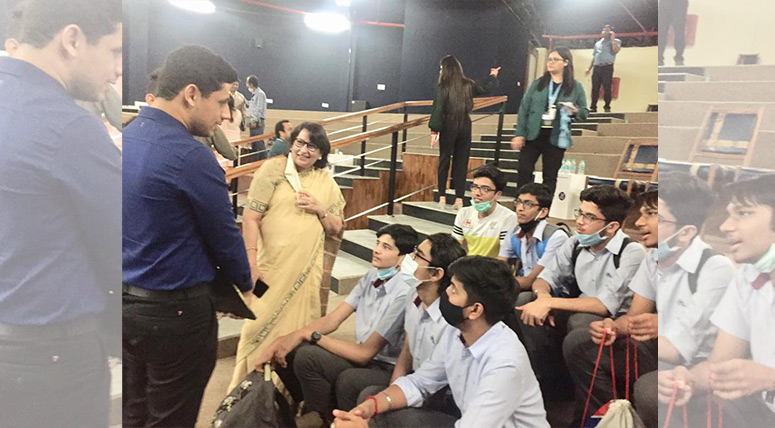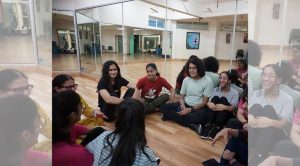THE SUCCESS VIBES-Speak Right!


THE RIGHT WAY TO COMMUNICATE
Vandana Mahajan, Senior School Headmistress, MRIS 46, Gurugram, explains how we can be an effective communicator. It takes time and energy to become a great communicator. Though some people start out better than others, you can improve as long as you put in the effort.
“Communication works for those who work at it.” – John Powell

Communication is the process of conveying messages as facts, ideas, opinions, thoughts, knowledge, data, perspectives etc. from one person/group to another in the form of either written messages like sending emails, talking over the phone, or having a discussion with a person or group of people in a personal or a professional setting etc. Therefore, Communication can be verbal, non-verbal, written and visual. Now let us see what is an Effective Communication?
Effective Communication is the skill of exchanging information in a manner that the message is received and understood by the receiver/s with clarity and purpose and without any miscommunication or communication gap. This is an important life skill as words, gestures and actions can build or destroy relationships. Communication or the lack of the same often becomes the deciding factor in the outcome of any human interaction or association, professionally or personally. That is why it is a skill we must learn, master thoroughly.
No matter your age, background, or experience, effective communication is a skill that builds bridges, mends relationships and facilitates team building. Good communication skills empower you to become effective leaders and manage people and relationships better. The 7 C’s of Communication are Coherence, Concreteness, Courtesy, Correctness, Clarity, Confidence and Conciseness. The seven C’s of communication is a list of principles that you should ensure all of your communications adheres to. Their purpose is to ensure that the person you’re communicating with, hears and understands, what you’re trying to say.
Some of the greatest leaders of all time are also fantastic communicators and orators. Communication is the cornerstone of our interactions with people and has many facets and nuances. Communication can be Assertive, Passive, Submissive, Persuasive or Manipulative, but a good and effective exchange between people is based on emotional awareness, open mindedness, willingness to listen, empathize and acceptance of views and perspectives which are diametrically opposite to ours.
The idea is to reach a common ground and find solutions to be able to work, exist, strive and thrive together. Once messages are communicated clearly, there is little or no room for misunderstanding, misinterpretation or conflict. Clear and concise communication helps to build trust, strengthen personal and professional relationships, boosts teamwork and aids in decision making and problem solving.
So, let’s have a closer look at the finer nuances of an effective, purpose driven and powerful communication.
“When people talk, listen completely. Most people never listen”. – Ernest Hemingway

Most of the times we listen to react and not to respond! We do not listen to understand and as the other person is speaking, we are already preparing our reactions/responses in our minds, to what is being said. Listening with an intention to understand the other’s point of view, is the most important aspect of an effective communication as it makes the environment congenial and gives people the courage to speak their innermost apprehensions with faith, trust and openness. In a family where the parent takes a break from his/her work, just to listen what the child has to say, paves the way for a beautiful parent child bond of lifelong trust and love.
Being heard is the most important need of a human being. Sometimes, the only thing people want, is that someone just listens to them with all their attention and heart.
As rightly said by Peter Drucker, “The most important thing in Communication is hearing what isn’t said.”
It is important to remember that ‘Map is not the territory’ when dealing with difficult people whom we find difficult only because they think, act and behave differently than us. But it is these differences what actually pave the way for great teams to work together and find solutions to the seemingly most difficult problems in the world. Unfortunately, we are so wrapped up in our own ideas of right and wrong that we don’t truly listen to what others have to say. We often are guided by our limiting beliefs, stereotypical genesis and ecosystems.
Active listening involves paying close attention to what the other person has to say and builds relationships and deepens human connections. Understanding the emotional state of your audience, their interests, likes, preferences etc. helps you to decide the type of interaction you ought to have with them. With this understanding you can persuade them to your way of thinking.
An effective communicator is someone who conveys their message thoroughly and is receptive and responsive to others’ input. Those who are strong communicators speak in a clear, direct manner, using easily understood language. Asking open ended questions during the course of a conversation, makes way for a congenial atmosphere of mutual trust which helps in understanding the situation with an open, inquisitive and receptive mind. They also lead to conversations that are meaningful, concise and mutually satisfying.
Asking the right questions makes the communication flow with empathy and consideration.
Therefore, it is helpful if we ask questions to the listeners like, I hope what I am saying is making sense to you? Or instead of assuming that the other person has understood your perspective, asking them to rephrase and say the same thing in their own words to understand if there is any communication gap, also helps. This is especially useful in the context of a classroom where encouraging students to interact and engage in healthy discussions is critical to their learning. This makes them involved and engages them positively.
Another important ingredient of an effective Communication is ‘being Assertive and stating your opinions, needs and wants’ in a way that respects the rights of other people as well. There is a fine line between being assertive and being aggressive.
Communicating in a way that does not make the other person feel threatened or devalued, is an art that we master with time, experience and will. It is a learning journey that is sure to reap rich dividends if we put in effort at understanding differing opinions with an open mind.
Another important ingredient of an effective communication is Story Telling as people tend to understand situations better when woven in relatable stories. Whether it is about persuading people of something, or inspire them to do something, or open up about a difficult topic, stories tend to ease them out and make them come out of their closed zones and express vividly.
This is also something that I have experienced and practised thoroughly with my children and students. Whether it is about motivating them to have a clear vision and a strong purpose in life or inspiring them to cultivate ethics and virtues in their personality, I go extra mile. If they want to open up about their apprehensions or to become valuable members of the community, storytelling makes them shed their fears, inhibitions and insecurities as it makes them feel hopeful and gives them the courage to speak with an understanding that they are not alone or unique in their vulnerabilities. We are all human, and our stories of overcoming life’s challenges, trials and tribulations, inspire others in a huge way. After all, we are all survivors in this game of life in our own special way!
A key feature of an effective communication is knowing when and how to vent out your feelings in a calm, composed and dignified manner. You don’t have to be an expert communicator to know that venting out in a wrong manner and at the wrong time, is a sure recipe for disaster. When you are angry or upset, let the feeling calm down and then take stock of your thoughts before venting out. Thoughtless words and actions or gestures can come across as abrasive and condescending and derail even the best intended communications and, in the bargain, hurt sentiments and demotivate people to express honestly.

An effective way of doing measured venting out is by writing down your thoughts before an interaction which helps you to stick to the main agenda and the prospective outcome by giving clarity of thought during a discussion. This also helps you to stay focussed on a few key points around which the topic of conversation should ideally revolve, in order to not let the communication wander and go haywire to unnecessary and controversial details. Venting out your honest displeasure or inconvenience, without hurting the sentiments of others, is a wonderful life skill that we can all cultivate with practice.
Furthermore, Humour breaks down barriers, reduces stress and tension and builds rapport instantly putting people at ease and helping the situation ease out. But it is a tricky thing and can get you into trouble if not used properly. If humour is used appropriately, it can turn out into one of the most powerful and effective tool in your communication arsenal. Hence usage of humour should be done judiciously.
Right ‘Humour’ can help you make a point without antagonising people and without sounding overly aggressive or arrogant. One interesting way to do is to use self-deprecating humour and poke fun at yourself thereby helping people relax and accept you as one of them. Example, if your senior calls you into their office, and you are a bit confused. The moment you enter the office, you understand, that, that was not the best of the days for you! But you know how to immediately ease out the tension and bring it down to a comfortable level. In fact here I am also reminded of a personal anecdote. Once I was reprimanded by one of my mentors for a late submission of work by my team. I could sense a certain tension in between us after the conversation.. Next day as I met her, I told her that my son was very happy that there is someone who can scold his mom as well! She burst into laughter and the strain of the last few hours vanished in seconds! So yes, right humour eases out tense situations in a whisker😊

Effective Communication involves active listening, compassion, cultural awareness, trust quotient and a level of personal connection to get the message across undiluted and understood as it has been expressed. It requires a positive body language, transparency, honesty, personalisation, empathy and many more positive traits. No matter how bad the situation is, approaching the same with a conversation with the resolution to reach an acceptable and mutually beneficial solution surely helps.
Make your communication fit for purpose. Communications where people ‘talk’ a lot but ‘say’ a little, lack confidence, intent and sensitivity.
A good communication essentially is one where your attitude comes forth and involves listening with empathy and builds rapport, where the message is right-less is more. Effective communication also involves telling people what they do not want to hear and therefore, to be congruent and mean what you say.
The foundation for an effective communication is the relationship you have and/or are able to build with your audience by creating rapport and mutual trust in order to avoid miscommunication, and respond to criticism, without becoming critical. It has the quality of managing confrontation without conflict and address conflict resolution as a way forward by understanding the destructive power of defensiveness. Thoughtful and deliberate communication saves time as frustrating communication gaps are covered by productive and interesting communications. Conversations that are aimed at understanding, problem solving and conflict resolution help in making strong connections as they are based on empathy and intuitive listening.
In Conclusion, when communication is effective, it leaves all parties involved satisfied and feeling accomplished. If messages are delivered clearly, there is no room for misunderstanding, which decreases the potential for any type of conflict. Therefore, Effective Communication is one of the key life skills we need to imbibe, practice and cultivate for maintaining healthy and productive relationships at work, at home and in the larger world.
Author: Vandana Mahajan, Senior School Head Mistress, MRIS 46, Gurugram.
Related Blogs
-
11 Feb 2025
The Advantages of Choosing the Best CBSE School in Faridabad

-
 11 Feb 2025
11 Feb 2025Finding the Right Fit: Schools in Faridabad for Every Student
-
 11 Feb 2025
11 Feb 2025A Comprehensive Guide to the Top Schools in Faridabad
-
 11 Feb 2025
11 Feb 2025What Makes a School the Best in Faridabad? Key Factors to Consider
-
 11 Feb 2025
11 Feb 2025Exploring the Benefits of Enrolling in the Best Play School in Faridabad
-
 05 Feb 2025
05 Feb 2025The Roles and Responsibilities of Parents in Schools
-
 16 Jan 2025
16 Jan 2025Why Should I Choose IB Schools Over Others?
-
 19 Dec 2024
19 Dec 2024The Roles and Responsibilities of Parents in Schools
-
 10 Dec 2024
10 Dec 2024How to Improve the Quality of Education in Schools
-
 23 Oct 2024
23 Oct 2024Cultivating the Leaders of Tomorrow through MRIS Charmwood LEAPS Innovative Framework
-
 23 Oct 2024
23 Oct 2024Cultivating the Leaders of Tomorrow through MRIS Charmwood LEAPS Innovative Framework
-
 04 Oct 2024
04 Oct 2024Extracurricular Activities and Their Importance in Student Development.
-
 04 Oct 2024
04 Oct 2024Extracurricular Activities and Their Importance in Student Development.
-
 17 Sep 2024
17 Sep 2024Tech world by winning the prestigious Coolest Project competition
-
 16 Sep 2024
16 Sep 2024International English Olympiad conducted by the National Olympiad Foundation.
-
 16 Sep 2024
16 Sep 2024The MRIS Edge: How We Prepare Your Child for Success
-
 16 Sep 2024
16 Sep 2024The MRIS Edge: How We Prepare Your Child for Success
-
 09 Sep 2024
09 Sep 2024Investiture Ceremony of the Primary Wing at Manav Rachna International School: A Celebration of Leadership
-
 06 Sep 2024
06 Sep 2024The inauguration of our avant-garde sports facilities
-
 05 Sep 2024
05 Sep 2024Adrika and Advik Mittal from MRIS Noida for their outstanding achievements
-
 29 Aug 2024
29 Aug 2024A Day in the Life of a student at MRIS Charmwood
-
29 Aug 2024
A Day in the Life of a student at MRIS Charmwood
-
 30 Jul 2024
30 Jul 2024Basketball championship trophyin the Girls U15 category
-
 30 Jul 2024
30 Jul 2024Judge’s Favorite title in the Hardware & Scratch category
-
 29 Jul 2024
29 Jul 2024Gen-Z Connect: The Family Dynamics
-
 15 Jul 2024
15 Jul 2024The Investiture Ceremony
-
 15 Jul 2024
15 Jul 2024The Aakarshan Inter-Clan Cultural Competition 2024
-
 15 Jul 2024
15 Jul 2024Gold Medal in the 11-14 age category
-
 15 Jul 2024
15 Jul 2024Celebrating the Achievements of Our Alumni
-
 15 Jul 2024
15 Jul 2024Awarded the prestigious: Best District Principal by the Science Olympiad Foundation.
-
 29 Jun 2024
29 Jun 2024ACTIVITIES ON BOARD: THE SUMMER FUN-BUS
-
 15 Jun 2024
15 Jun 2024Manav Rachna International School, has recently made an impressive foray into the world of music with the launch of his debut song, ‘Teri Godi’ on his YouTube channel.
-
 15 Jun 2024
15 Jun 2024Gold medal in the Vidya Valley Taekwondo and Karate Championship!
-
 15 Jun 2024
15 Jun 2024Retro-themed Movie Night
-
 14 Jun 2024
14 Jun 2024BONDING FOR BETTER: THE SUMMER TIMES!
-
 10 Jun 2024
10 Jun 2024SUNLIT TIME: THE STEM EXPLORATION FLIGHT
-
 05 Jun 2024
05 Jun 2024PLAYGROUND TO PODIUM: THE FAME STORIES
-
 02 May 2024
02 May 2024Sports' Elixir: Strength and Success!
-
 16 Apr 2024
16 Apr 2024School Scholarships: Feats of Success!
-
 06 Apr 2024
06 Apr 2024Farewell to the remarkable Class of 2023-24
-
 06 Apr 2024
06 Apr 2024Learning is the process whereby knowledge is created through the transformation of experience.
-
 06 Apr 2024
06 Apr 2024Ojaswini and Ojasv, students of MRIS Mohali, achieved record-breaking success at the Shubhankar Sharma Invitational Tournament in Panchkula
-
 03 Apr 2024
03 Apr 2024PLAYGROUND FOR MINDS! THE RIGHT PLATFORM
-
 20 Mar 2024
20 Mar 2024DISCIPLINING EXAM PATH: THE RIGHT WAY!
-
 04 Mar 2024
04 Mar 2024Kala Sanyojan- The Unique Art Fest at MRIS-46
-
 26 Feb 2024
26 Feb 2024MRIS Noida unfolded the eco-spectacle of Cyclothon2024
-
 26 Feb 2024
26 Feb 2024Mr. Manish Panthri, HOD, Hindi & Sanskrit, MRIS Noida has been awarded the prestigious 'Hindi Shikshak Samman' by the New Saraswati House.
-
 26 Feb 2024
26 Feb 2024Mr. Hutansh Verma, HOD, Fine Arts, MRIS Noida set a World Record for making the maximum number of portraits of Martyrs.
-
 26 Feb 2024
26 Feb 2024Pallavi Anand, the Primary Wing Co-ordinator, received the Favourite Teacher Award
-
 26 Feb 2024
26 Feb 2024Nindiya Saket, Principal, MRIS Noida achieved yet another remarkable milestone with the 'Top Educator Award'
-
 26 Feb 2024
26 Feb 2024Manav Rachna International School takes pride in the remarkable accomplishment of Ms. Nindiya Saket, Principal, MRIS Noida
-
 21 Feb 2024
21 Feb 2024Dhruv Bajaj, a grade Xl student at MRIS Charmwood, has made us proud at the 38th National Taekwondo Championship 2023 in Bangalore
-
 21 Feb 2024
21 Feb 2024We are immensely proud to share the incredible achievements of Samraddhi Datt Jowhry, a Grade 4 student from Manav Rachna International School, Charmwood!
-
 21 Feb 2024
21 Feb 2024MRIS Charmwood's esteemed Principal. Ms Divjot Kaur has been bestowed with the prestigious "India's Most Impactful School Leaders in 2023"
-
 06 Jan 2024
06 Jan 2024CBSE Exam Elixir: The Right Parenting!
-
 28 Dec 2023
28 Dec 2023Tunes and Twirls: Yet another Extraordinary Annual Day Celebration by Manav Rachna International School, Charmwood.
-
 28 Dec 2023
28 Dec 2023Srijan- The Primary Wing of Manav Rachna International School, Charmwood
-
 28 Dec 2023
28 Dec 2023Spandan' - The Musical Odyssey: Annual Day Presentation by Middle Wing MRIS Charmwood
-
 10 Dec 2023
10 Dec 2023Ten students of MRIS 21C participated in CONVENTUS MUN 2023 and shined with their brilliant performance
-
 10 Dec 2023
10 Dec 2023Manav Rachna International School, Sector 21C, Faridabad, has clinched the title of ‘Best in Sports and Games’ at the prestigious Global Education Fest 2023 AKS Education Awards
-
 10 Dec 2023
10 Dec 2023Ms. Nandini Awasty has been honoured with the prestigious ‘Outstanding Headmistress’ award
-
 10 Dec 2023
10 Dec 2023Yaana Arora won a silver medal in the Haryana State Roller Skating
-
 05 Dec 2023
05 Dec 2023CBSE Success Guide: Balancing Emotions!
-
 22 Nov 2023
22 Nov 2023Another Feather in the Cap!
-
 22 Nov 2023
22 Nov 2023Competition strengthens character and reveals true potential.
-
 27 Oct 2023
27 Oct 2023Arduous Apotheosis: Success Brewed
-
 18 Oct 2023
18 Oct 2023MRIS Charmwood is proud to share the toppers of Grade XII CBSE 2022-23 Examinations Dhwani Jain from Commerce stream is the school topper with 98% followed by Kabir Dhawan as the Humanities topper with 96.6% and Science topper with 95%.
-
 18 Oct 2023
18 Oct 2023MRIS Charmwood raising the Banner High!
-
 18 Oct 2023
18 Oct 2023Spectrum: the magical moments from SPECTRUM - a Special Theme Culmination Assembly held at Manav Rachna International School Charmwood.
-
 18 Oct 2023
18 Oct 2023Guryash Pratap Singh of Grade 5 Mother Teresa for his appreciable performance in the Hindustan Times Olympiad, 2023
-
 18 Oct 2023
18 Oct 2023The First Haryana State Open Zonal Roller Skating Championship
-
 26 Sep 2023
26 Sep 2023Agam Chawala of Grade V won Silver medal in the Karate Sate Challenge Cup 2023
-
 26 Sep 2023
26 Sep 2023Vidit Sethi secured First Position at the UP State Chess Championship
-
 23 Sep 2023
23 Sep 2023Ms. Priyanka Singh, honored with the esteemed accolade of Asia's Finest Educator
-
 23 Sep 2023
23 Sep 2023Ms. Rakhi Garg, honoured with the prestigious title of Asia's Finest Educator
-
 11 Sep 2023
11 Sep 2023Link to Success with Strong Study Habits
-
 29 Aug 2023
29 Aug 2023Success Mantra of Life: Be Multilingual
-
 28 Aug 2023
28 Aug 2023Commercium V - The Commerce Week
-
 25 Aug 2023
25 Aug 2023CHANDRAYAAN-3: On the Moon! Over the Moon!
-
 08 Aug 2023
08 Aug 2023Decoding the Art of Textbook Learning
-
 04 Aug 2023
04 Aug 2023Mother's Day
-
 04 Aug 2023
04 Aug 2023A Golf Prodigy in the Making
-
 02 Aug 2023
02 Aug 2023The Pant brothers of MRIS Mohali
-
 01 Aug 2023
01 Aug 2023READING: The Strongest Brick in Academic Building
-
 28 Jul 2023
28 Jul 2023Unlock the Power of Goal-Oriented Pedagogy
-
 19 Jul 2023
19 Jul 2023Zoom On the Transformative Power of Technology
-
 15 Jul 2023
15 Jul 2023Mother's Day Celebrations
-
 15 Jul 2023
15 Jul 2023Another feather in the cap for Gauri Rai
-
 05 Jun 2023
05 Jun 2023Reader of the Week
-
 02 Jun 2023
02 Jun 2023Reader's of the week
-
 02 Jun 2023
02 Jun 2023Mother's Day EY-PY
-
 02 Jun 2023
02 Jun 2023Mother's Day PY-MY
-
 11 May 2023
11 May 2023Reader of the week
-
 11 May 2023
11 May 2023Readers of the week
-
 11 May 2023
11 May 2023Edutrip to the Farm
-
 19 Apr 2023
19 Apr 2023What Shapes the IB Education at MRIS?
-
 18 Apr 2023
18 Apr 2023Reader of the Week
-
 18 Apr 2023
18 Apr 2023Readers of the week
-
 17 Apr 2023
17 Apr 2023GOOD SLEEP IS THE BEST ENERGIZER
-
 05 Apr 2023
05 Apr 2023The National Standard Examination In Junior Science (NSEJS)
-
 23 Mar 2023
23 Mar 2023SUCCESSFUL STUDENT INVENTORS
-
 19 Mar 2023
19 Mar 2023Sportek 20223-23- The Annual Sports Meet
-
 19 Mar 2023
19 Mar 2023Pratham Gupta shines as a Young Author Panelist at the Lit Fest
-
 19 Mar 2023
19 Mar 2023Let the passion drive your profession
-
 19 Mar 2023
19 Mar 2023Persistence is the key that unlocks potential
-
 18 Mar 2023
18 Mar 2023THE ENIGMATIC GALAXY: OUR SPACE
-
 06 Mar 2023
06 Mar 2023The ‘Reader of the week’
-
 06 Mar 2023
06 Mar 2023The ‘Reader of the week’
-
 06 Mar 2023
06 Mar 2023The ‘Reader of the week’
-
 06 Mar 2023
06 Mar 2023The ‘Reader of the week’
-
 06 Mar 2023
06 Mar 2023Theme-based learning integrates different learning areas and skills
-
 03 Mar 2023
03 Mar 2023The best education is one that you experience
-
 14 Feb 2023
14 Feb 2023MRIS-21C celebrated the Republic Day
-
 04 Feb 2023
04 Feb 2023Mrs. Seema Anis the Principal has been awarded the ‘Educational Reformer of the Year
-
 11 Jan 2023
11 Jan 2023Solving the 'Gaming' Mystery!
-
 11 Jan 2023
11 Jan 2023Success in life is not for those who run fast
-
 11 Jan 2023
11 Jan 2023Let’s honour those who protect the Nation’s honour!
-
 11 Jan 2023
11 Jan 2023Winter’s firstborn snow dots the soul with magic.
-
 10 Jan 2023
10 Jan 2023ANUSMRITI- THE ALUMNI MEET
-
 10 Jan 2023
10 Jan 2023Manav Rachna Cricket Challenge Cup for the under 14 at MRIS 46, Gurugram
-
 10 Jan 2023
10 Jan 2023MRIS-46 won the Best Country Profile trophy
-
 10 Jan 2023
10 Jan 2023Spark- The Entrepreneurship Conclave
-
 09 Jan 2023
09 Jan 2023Inspiring Sporting Success @2023
-
 02 Dec 2022
02 Dec 2022Save the stripes from being striped
-
 26 Nov 2022
26 Nov 2022Students at MRIS-21C learned the concept of Circle graphs
-
 07 Nov 2022
07 Nov 2022PLATINUM BAND across India in the MHW School Rankings 2022
-
 21 Oct 2022
21 Oct 2022Success Mantra of Our Persona!
-
 15 Oct 2022
15 Oct 2022Our Family-The Healing Machine!
-
 07 Oct 2022
07 Oct 2022The prestigious Pride of India Award, 2022
-
 06 Oct 2022
06 Oct 2022THE SUCCESS VIBES-Speak Right!
-
 29 Sep 2022
29 Sep 2022Compete! With The Right Spirit!
-
 23 Sep 2022
23 Sep 2022“Champions are made by their passion and persistence."
-
 20 Sep 2022
20 Sep 2022Mrs. Seema Anis, Principal MRIS 21C, awarded the ‘Best Principal Award’ by Jims
-
 17 Sep 2022
17 Sep 2022“The distance between insanity and genius is measured only by success.”
-
 13 Sep 2022
13 Sep 2022THE PET THERAPY UNFOLDED!
-
 27 Aug 2022
27 Aug 2022Tackling Tempers and Tantrums -the Right Way!
-
 27 Aug 2022
27 Aug 2022“Vision is not enough. It must be combined with venture. It is not enough to stare up the steps, we must step up the stairs.”. – Vaclav Havel
-
 25 Aug 2022
25 Aug 2022Ashna Saini of Grade 4 had shown an exemplary performance in SOF-International Mathematics Olympiad 2021-22.
-
 20 Aug 2022
20 Aug 2022Ojas Adhana, Grade 8 has authentically created the Multipurpose Flying Garden Machine
-
 18 Aug 2022
18 Aug 2022Pranav Jithesh,
-
 30 Jul 2022
30 Jul 2022The success of a school is a collaborative effort of its teachers, students and parents
-
 30 Jul 2022
30 Jul 2022“The secret of joy in work is contained in one word - Excellence.”
-
 29 Jul 2022
29 Jul 2022Success is simply the feeling of satisfaction and happiness which can only be achieved through serious hard work, determination and a little bit of opportunity.
-
 28 Jul 2022
28 Jul 2022Delighted to reveal the top performers of our first batch of Grade 10 at MRIS Mohali.
-
 08 May 2022
08 May 2022Mother’s Day
-
 11 Nov 2021
11 Nov 2021Anvi Suri qualified for the 37th Sub-Junior and 47th Junior National Aquatic Championship
-
 09 Nov 2021
09 Nov 2021EY Headmistress facilitated as the Master Trainer
-
 30 Oct 2021
30 Oct 2021Teacher Awarded as the Dynamic Teacher of the Year 2021
-
 07 Oct 2021
07 Oct 2021“Champions don’t become champions overnight. They become one when they have something deep inside them-a dream to fulfill, a desire to be the best.”
-
 07 Oct 2021
07 Oct 2021Tisha Kalsi won the Gold medal in Punjab State Karate Championship
-
 06 Oct 2021
06 Oct 2021180+ Teachers and Students were apprised about Waste Segregation during the first leg of ‘Swachh School Swachh Ghar’ Workshop
-
 20 Sep 2021
20 Sep 2021MRIS Mohali firmly resonates with the vision of Dr O P Bhalla Foundation that 'Nobody should sleep hungry.'
-
 20 Sep 2021
20 Sep 2021Aashna Aftab secured the first position in the ‘Puppet Maestro’ category in Ullas 2021
-
 15 Sep 2021
15 Sep 2021Jasraj Singh won the first position in District Badminton Championship
-
 14 Sep 2021
14 Sep 2021Student bags 2nd Rank in the 17th National Online Soroban and Anzan Competition
-
 14 Sep 2021
14 Sep 2021Idriss Dahiya brought accolades to the school as she showcased her athletic fervor in ‘Khelo Haryana’ competition held at state level.
-
 09 Sep 2021
09 Sep 2021GTEA recognizes as the Best Online Education Platform
-
 04 Sep 2021
04 Sep 2021Hunar possesses the splendid painting skills
-
 02 Sep 2021
02 Sep 2021Budding shooter brings laurels to the school!
-
 27 Aug 2021
27 Aug 2021MRIS Mohali among the finalists of Toycathon 2021
-
 27 Aug 2021
27 Aug 2021Arnav bags first position in the Haryana Table Tennis Tournament
-
 20 Aug 2021
20 Aug 2021MRIS Charwood's singers bring laurels to the school
-
 20 Aug 2021
20 Aug 2021Students bag the second position in the Sciencetoon
-
 18 Aug 2021
18 Aug 2021Divaa Goyal of Grade 5, shines in the Punjab Fencing Open Championship
-
 17 Aug 2021
17 Aug 2021Saransh Gupta bagged the first position in Inter Manav Rachna Elocution Contest
-
 13 Aug 2021
13 Aug 2021Navpreet Brar bags the ‘Best Science Teacher Award’
-
 12 Aug 2021
12 Aug 2021Workshop by Therapist from Fortis Health Memorial Research Institute
-
 09 Aug 2021
09 Aug 2021The 2020 Ensemble
-
 06 Aug 2021
06 Aug 2021Kudos to the Young achiever 2021
-
 04 Aug 2021
04 Aug 2021Students dazzle brilliantly in the CBSE AISSCE Class X Examination 2021
-
 04 Aug 2021
04 Aug 2021Students of Grade X achieved excellent accomplishment in the AISSE CBSE Board Exams 2021
-
 03 Aug 2021
03 Aug 2021MRIS-51 Gurugram welcomes back its students to the campus
-
 03 Aug 2021
03 Aug 2021Student won the Viewer’s Choice Award in Inter-School Photography Competition
-
 03 Aug 2021
03 Aug 2021Students among the Top Five Schools in ‘ATL Community Day 21’
-
 03 Aug 2021
03 Aug 2021One of the Many Shining Stars
-
 26 Jul 2021
26 Jul 2021‘The Health Hour’ Session 2021
-
 26 Jul 2021
26 Jul 2021Kudos to the Skillathon Winners
-
 26 Jul 2021
26 Jul 2021Grade V Students enacted a story on the importance of Forgiveness
-
 23 Jul 2021
23 Jul 2021One of the Best Schools for Innovation in School Curriculum and Co-Scholastic Activities
-
 23 Jul 2021
23 Jul 2021Fine Motor Mathematics Activity through a Bingo Game
-
 09 Jul 2021
09 Jul 2021Ashvik Agrawal won the first position in the Nationals of Scratch Olympiad
-
 08 Jul 2021
08 Jul 2021Students steal the show at VIVIDHA
-
 05 Jul 2021
05 Jul 2021Interactive session on Oral Health for students & parents on the occasion of Doctor’s Day
-
 01 Jul 2021
01 Jul 2021Ambreen Kaur of Grade IX awarded The Hindustan Times LenovoSmartED Scholarship
-
 30 Jun 2021
30 Jun 2021ATL Community Day for the middle school students
-
 29 Jun 2021
29 Jun 2021Tinkering Activity ‘Walk in the Snow’ for Grade III students
-
 25 Jun 2021
25 Jun 2021Father’s Day Celebrations by Early Years and Grade I
-
 25 Jun 2021
25 Jun 2021Students awarded with the Adolescent Peer Leadership Award
-
 24 Jun 2021
24 Jun 2021MRIS Noida Principal bestowed with ‘The Most Updated Principal’ Award
-
 21 Jun 2021
21 Jun 2021Interactive Session with the academic life coach, Ms. Sanyogita Sharma for Grade IX and X students
-
 20 Jun 2021
20 Jun 2021Vidit Sethi pf MRIS Noida wins the UP State Chess Championship 2021
-
 18 Jun 2021
18 Jun 2021Physics Activity for Grade X Students on the ‘Online Laboratory Platform’
-
 18 Jun 2021
18 Jun 2021Special Educator recognized with the ‘Inclusive Education for Special Needs Children Award’
-
 20 May 2021
20 May 2021“Rainbow Razzmataz” to celebrate Motherhood: MRIS-51 Gurugram
-
 17 May 2021
17 May 2021Student makes it to the India Book of Records for 100% Attendance for 12 consecutive years
-
 16 May 2021
16 May 2021MRIS Mohali commemorates the legendary poet - Rabindranath Tagore
-
 15 May 2021
15 May 2021The emotional well-being of our young ones!
-
 28 Apr 2021
28 Apr 2021Orientation Session for Grade XI students & their parents
-
 22 Apr 2021
22 Apr 2021Anahita Mishra proves her mettle at the 58th National Roller-Skating Championship 2020-2021
-
 22 Apr 2021
22 Apr 2021Orientation Program strengthening the bond between Teachers and Parents
-
 31 Mar 2021
31 Mar 2021Aayan achieved the second rank in SOF National Cyber Olympiad
-
 20 Mar 2021
20 Mar 2021Ryan Nangia bags bronze at the RSFI State Skating Championship 2020-21
-
 20 Mar 2021
20 Mar 2021Stupendous success of students in JEE MAINS 2021
-
 20 Mar 2021
20 Mar 2021Kindergarteners celebrated their Graduation Day
-
 20 Mar 2021
20 Mar 2021Orientation Programme for the incoming batch of Grade VI & IX students
-
 10 Mar 2021
10 Mar 2021Ms. Monika Mukh received the ‘Best Librarian’ Award
-
 10 Mar 2021
10 Mar 2021Student bags medal at the RSFI State Inline Roller Hockey Championship 2020-21
-
 04 Mar 2021
04 Mar 2021Celebration of Zimriya- the musical saga
-
 02 Mar 2021
02 Mar 2021Articles on Contemporary Issues featured in The Hindustan Times
-
 01 Mar 2021
01 Mar 2021Somya Gupta bagged laurels from the 55th Punjab State Shooting Championship
-
 01 Mar 2021
01 Mar 2021Student secures top position at the 17th Junior Golf Championship
-
 26 Feb 2021
26 Feb 2021Congratulations to the IEO Achievers
-
 11 Feb 2021
11 Feb 2021Crest workshop by the CREST Lead
-
 09 Feb 2021
09 Feb 2021Kids of Foundation Stage wow everyone with their Talent at CeleFiesta
-
 09 Feb 2021
09 Feb 2021Virtual session on ‘Integrity and Honesty- the essence of life’
-
 06 Feb 2021
06 Feb 2021Virtual presentation on the theme ‘Nature Love’ by Grade II-G students
-
 03 Feb 2021
03 Feb 2021Ojaswini bags 1st Position in the Indian Golf Union (IGU) Junior Feeder Tour 2021 Event -1
-
 03 Feb 2021
03 Feb 2021Virtual Theme Assemblies at Primary Wing
-
 03 Feb 2021
03 Feb 2021Student sets World Record on the Xbox Platform, enters Guinness Book of World Records
-
 02 Feb 2021
02 Feb 2021Gauri Rai selected for a scholarship of Rs 1,00,000 by the Ice Skating Association of India
-
 28 Jan 2021
28 Jan 2021Grade V Students present Class Assembly on ‘RAINBOW THERAPY OF VIRTUES’
-
 13 Jan 2021
13 Jan 2021The Hindustan Times,January 11, 2020, Page no. 2
-
 12 Jan 2021
12 Jan 2021Principal awarded the ‘Best Educationist and Mentor’ in Women Conclave Awards 2021
-
 25 Dec 2020
25 Dec 2020Ambassador of the Code Bharat community
-
 25 Dec 2020
25 Dec 2020The orientation of Academic Excellence Program
-
 25 Dec 2020
25 Dec 2020Assembly on the theme of ‘Resilience’
-
 25 Dec 2020
25 Dec 2020National Mathematics Day 2020
-
 25 Dec 2020
25 Dec 2020Organised MATH MANIA for grade I – IV to celebrate National Mathematics Day
-
 21 Dec 2020
21 Dec 2020Virtual Class Assembly on “Let’s Celebrate the Farmer - The Feeding Man” by Grade 5A Students
-
 21 Dec 2020
21 Dec 2020Classification of Materials On The Basis Of Their Properties Grade VI Science
-
 14 Dec 2020
14 Dec 2020Theme Assembly Grade 4E Arctic
-
 02 Dec 2020
02 Dec 2020Students clear the CLAT Examination with flying colours
-
 30 Nov 2020
30 Nov 2020THE ANNUAL APPRECIATION DAY (SCHOLAR BADGE) CEREMONY
-
 30 Nov 2020
30 Nov 2020TALENTHON’2020: Students amaze with their Poetry Dramatization Skills
-
 23 Nov 2020
23 Nov 2020Virtual Class Assembly on 'We are the Change Makers' @ MRIS-Sector14, Faridabad
-
 05 Nov 2020
05 Nov 2020Toddlers to KG kids mesmerize with their SPECTRUM presentations
-
 21 Oct 2020
21 Oct 2020Webinar on ‘Feeding the World’ by Mr. Ankush Gupta
-
 19 Oct 2020
19 Oct 2020Success of MRIS Charmwood students in NEET 2020
-
 16 Oct 2020
16 Oct 2020'Food Around the World' Activity at Kindergarten
-
 16 Sep 2020
16 Sep 2020Students Prove Their Mettle @ JEE Main-2020
-
 14 Sep 2020
14 Sep 2020Inter-School Debate competition for the students of Grade X to XII
-
 04 Sep 2020
04 Sep 2020Grade IV Students design & plan their DreamCity
-
 05 Aug 2020
05 Aug 2020Grade II Students showcase their learning on ‘States of Matter’
-
 04 Aug 2020
04 Aug 2020Virtual farewell for the outgoing batch of Grade XII
-
 27 Jul 2020
27 Jul 2020The 6 Imperative skills for students in today's world!!!
-
 23 Jul 2020
23 Jul 2020MRIS, Noida Principal honoured with the Most Innovative Principal Award
-
 23 Jul 2020
23 Jul 2020Students researched about locusts & presented their work
-
 21 Jul 2020
21 Jul 2020Exploring the animal kingdom with show and tell activity
-
 21 Jul 2020
21 Jul 2020Students learnt about the Moon Day
-
 18 Jul 2020
18 Jul 2020Student secures 3rd position in the coveted Tell-ur-Tale 3.0 Challenge
-
 23 Jun 2020
23 Jun 2020Father’s Day Celebration (Foundation Years)
-
 23 Jun 2020
23 Jun 2020Celebrates Father’s Day 2020
-
 23 Jun 2020
23 Jun 2020Father’s Day Celebration 2020
-
 18 Jun 2020
18 Jun 2020What is the Perfect Age for Pre-school?
-
 12 Jun 2020
12 Jun 2020Student made an intriguing sketch of the school building
-
 27 May 2020
27 May 2020Join the parole…..
-
 16 May 2020
16 May 2020Another feather to its cap; a milestone achieved by The Manav Rachna student at a very young age....
-
 12 May 2020
12 May 2020Special Virtual Session on the eve of 'Mother's Day'
-
 08 May 2020
08 May 2020Spirit Day Celebration with the MRIS Family
-
 04 May 2020
04 May 2020The Why and How of Antibiotic Resistance – An Informative Session by scientist, Dr. Deepti Jain
-
 01 May 2020
01 May 2020Activities under First CREST Theme of Grade 1
-
 01 May 2020
01 May 2020'Then and Now' Activity
-
 21 Apr 2020
21 Apr 2020MRIS-14 Faridabad honoured as the ‘ATL School of the Month’
-
 07 Apr 2020
07 Apr 2020My Learning From The Stars
-
 16 Mar 2020
16 Mar 2020Students prove their mettle at Sandhrit
-
 16 Mar 2020
16 Mar 2020Students spread the message of a Corona Safe Holi
-
 16 Mar 2020
16 Mar 2020Theme Presentation ‘Technoshala’
-
 03 Mar 2020
03 Mar 2020‘The Gallery Walk’ for Grade I-III
-
 03 Mar 2020
03 Mar 2020‘Youngest Game Developer in the World’
-
 18 Feb 2020
18 Feb 2020Advik Mittal: The Karate Kid
-
 06 Feb 2020
06 Feb 2020Congratulations to the NSO Achievers
-
 04 Feb 2020
04 Feb 2020Students bag Medals at the Annual International French Exam 2019-2020
-
 03 Feb 2020
03 Feb 2020Citation Ceremony for the Outgoing Batch (2019-20)
-
 03 Feb 2020
03 Feb 2020Students shine at the Masters Open Table Tennis Tournament 2020
-
 03 Feb 2020
03 Feb 2020Students prove their oratory skills at Debate Competition
-
 03 Feb 2020
03 Feb 2020Farewell 2019-20 “May the road rise up to meet you. May the wind be even at your back. May the sun shine warm upon your face and the rainfall softly on your feet. And until we meet again, may God hold you in the hollow of his hands.”
-
 30 Jan 2020
30 Jan 2020The Sanskrit Effect
-
 30 Jan 2020
30 Jan 2020Save our Mother Earth
-
 27 Jan 2020
27 Jan 2020My dad is the best
-
 27 Jan 2020
27 Jan 2020Students prove their mettle in NSO & IEO
-
 27 Jan 2020
27 Jan 2020“One Nation Reading Together” event
-
 23 Jan 2020
23 Jan 2020Congratulations to the French Olympiad (ELE) Achievers
-
 21 Jan 2020
21 Jan 2020Students watched the live telecast of ‘Pariksha Pe Charcha’
-
 21 Jan 2020
21 Jan 2020Interaction with the Russian Delegate, Mr Pavel Frolov
-
 21 Jan 2020
21 Jan 2020Orientation Session on Theatre Excellence Programme
-
 20 Jan 2020
20 Jan 2020Stellar success of Vibhuti Bhatia
-
 20 Jan 2020
20 Jan 2020Students prove their mettle in JEE MAIN 2020
-
 15 Jan 2020
15 Jan 2020Important Life skills for children | How to teach them?
-
 31 Dec 2019
31 Dec 2019Pays homage to Sikh Sahibzade; remembers their sacrifice
-
 24 Dec 2019
24 Dec 2019Kartik Singh wins Kids Golf Malaysia World Championship for The Second Year in a Row
-
 24 Dec 2019
24 Dec 2019National Mathematics Day
-
 20 Dec 2019
20 Dec 2019‘Let’s Milk the Cow’ Activity for Toddlers
-
 20 Dec 2019
20 Dec 2019Kids prove their mettle at ‘Mathemania – the Math Fest’
-
 20 Dec 2019
20 Dec 2019“Champions keep playing until they get it right”
-
 20 Dec 2019
20 Dec 2019Awareness Programme by the Special Education Department (SEN)
-
 16 Dec 2019
16 Dec 2019Team stands out with the Best Scientific Illustration at SCI-SPECTACLE
-
 13 Dec 2019
13 Dec 2019Understanding the concept of 'Solar and Lunar Eclipse' in Grade 5
-
 10 Dec 2019
10 Dec 2019Young Chess Champion brought glory to the school
-
 06 Dec 2019
06 Dec 2019Toddlers Dance through the Jungle
-
 03 Dec 2019
03 Dec 2019The Iconic Japanese Dolls Festival celebrated
-
 03 Dec 2019
03 Dec 2019Recognition at The Times Educational Icon Awards 2019
-
 02 Dec 2019
02 Dec 2019Let’s take a walk in the jungle with MRIS Kindergarteners
-
 02 Dec 2019
02 Dec 2019Donated funds collected during Deepkriti to the Gautam Gambhir Foundation
-
 29 Nov 2019
29 Nov 2019Recognition at the Times Education Icons event
-
 28 Nov 2019
28 Nov 2019Ojaswini to represent India in the FCG Callaway World Championship
-
 27 Nov 2019
27 Nov 2019Story Enactment: 'The Hungry Caterpillar' by Nursery
-
 27 Nov 2019
27 Nov 2019Student wins Bronze in the National Table Tennis Tournament
-
 21 Nov 2019
21 Nov 2019Mathematics Brainiac
-
 20 Nov 2019
20 Nov 2019Taekwondo team brings laurels to the school
-
 19 Nov 2019
19 Nov 2019Student to compete In the Tennis Premier League 2019
-
 19 Nov 2019
19 Nov 2019Google can bring you back 100,000 answers, a librarian can bring you back the right one.
-
 14 Nov 2019
14 Nov 2019Role Play under theme ‘It’s Yummy’
-
 05 Nov 2019
05 Nov 2019Celebrating alliance with the Rotary Club
-
 31 Oct 2019
31 Oct 2019Students complete their first step in Vocal Music
-
 30 Oct 2019
30 Oct 2019Students shine at the Open State Swimming Championship
-
 30 Oct 2019
30 Oct 2019The Joy of Spreading Smiles
-
 22 Oct 2019
22 Oct 2019Addition of another feather in the cap
-
 16 Oct 2019
16 Oct 2019INDIA’S WATER CRISIS: THE CLOCK IS TICKING TOWARDS DAY ZERO
-
 14 Oct 2019
14 Oct 2019Students role-played in the set up of ‘Grocery Store’
-
 10 Oct 2019
10 Oct 2019Grade V students learnt about photosynthesis
-
 10 Oct 2019
10 Oct 2019Team performs outstandingly at the CBSE TT Tournament
-
 09 Oct 2019
09 Oct 2019The Preponderance of Shakti
-
 05 Oct 2019
05 Oct 2019Early Years kids learnt about the story of Rama and Ravana
-
 05 Oct 2019
05 Oct 2019Crusade against plastic and thermocol
-
 01 Oct 2019
01 Oct 2019Learning Outside the Classroom
-
 23 Sep 2019
23 Sep 2019Let us be the master of our lives
-
 18 Sep 2019
18 Sep 2019Nursery Theme Presentation
-
 18 Sep 2019
18 Sep 2019Students Paid Tribute to the Founder Visionary
-
 18 Sep 2019
18 Sep 2019Students outshine at the CBSE Swimming Championship
-
 13 Sep 2019
13 Sep 2019Theme Assembly by Grade 1
-
 12 Sep 2019
12 Sep 2019Appreciation for Thematic Activities’ Winners
-
 12 Sep 2019
12 Sep 2019Talent unlimited at the 2nd Edition of India Calling: 'Swarnim Bharat'
-
 11 Sep 2019
11 Sep 2019The Open Secret - Hard Work!!!
-
 11 Sep 2019
11 Sep 2019Spectrum by the students of Early Years
-
 11 Sep 2019
11 Sep 2019Manav Rachna Shooters Hit the Bull’s Eye Again
-
 05 Sep 2019
05 Sep 2019Theme Assembly for Grades 4 & 5
-
 05 Sep 2019
05 Sep 2019Making of the Infinity Gauntlet at Makershala
-
 03 Sep 2019
03 Sep 2019Kindergartners’ Theme Presentation
-
 03 Sep 2019
03 Sep 2019Team Manav Rachna Outshines again at the Inter School Drama Competition
-
 02 Sep 2019
02 Sep 2019‘Mathemania- Fun with Maths’
-
 30 Aug 2019
30 Aug 2019Ek Muthi Daan- a pebble in a pond that creates the ripple for change
-
 29 Aug 2019
29 Aug 2019First Special Assembly of the Session
-
 28 Aug 2019
28 Aug 2019Bringing Delhi-NCR's students closer through theatre, rap and Comedy
-
 26 Aug 2019
26 Aug 2019Librarian awarded the 6th National Conference of Chandigarh Librarians’ Association
-
 23 Aug 2019
23 Aug 2019MRIS-14 students experience the life of a media professional at the state-of-the-art studios of MRIIRS
-
 23 Aug 2019
23 Aug 2019Students explore the life of a dentist at specialised centres of MRIIRS
-
 23 Aug 2019
23 Aug 2019Accolades to the Skating Champion
-
 20 Aug 2019
20 Aug 2019The Trial in 21st Century
-
 20 Aug 2019
20 Aug 2019Classroom Management: Key to Kick Start the Year
-
 19 Aug 2019
19 Aug 2019Math Genius shine at Mathelete
-
 19 Aug 2019
19 Aug 2019Students proved their mettle at DELF A1
-
 19 Aug 2019
19 Aug 2019Book lovers' fiesta: The excitement continues
-
 14 Aug 2019
14 Aug 2019Ojaswini Saraswat outshines the best talents
-
 12 Aug 2019
12 Aug 2019Commercium III – The Commerce Week: Glimpses of Day 2
-
 09 Aug 2019
09 Aug 2019Shubham Gupta: The Budding Karate Kid
-
 06 Aug 2019
06 Aug 2019Commercium III- The Commerce Week begins
-
 05 Aug 2019
05 Aug 2019Session for MRIS Grade XI Students by The University of Newcastle
-
 01 Aug 2019
01 Aug 2019Ojaswini Sharma brings honors to the School
-
 01 Aug 2019
01 Aug 2019Students played numbers well at M’atheletics 2019
-
 01 Aug 2019
01 Aug 2019Wellness Workshop for EY Mothers by Dr. Mahima Bakshi
-
 01 Aug 2019
01 Aug 2019Print Coverage: Wellness Workshop for EY Mothers by Dr. Mahima Bakshi
-
 30 Jul 2019
30 Jul 2019Differential Learning: The New Model of Teaching-Learning Process
-
 30 Jul 2019
30 Jul 2019Experiential Learning – A Keystone in the Teaching-Learning Process
-
 29 Jul 2019
29 Jul 2019Responsible Citizens Of the Earth Projects Based On UNSDGs
-
 29 Jul 2019
29 Jul 2019Motherhood
-
 29 Jul 2019
29 Jul 2019Mother Earth
-
 29 Jul 2019
29 Jul 2019Mother
-
 26 Jul 2019
26 Jul 2019‘Do right Save light’- KG Kids on the Mission
-
 26 Jul 2019
26 Jul 2019Blood Donation Camp: Offering the gift of life to humanity
-
 26 Jul 2019
26 Jul 2019The Journey of a story: from Author’s mind to the book
-
 25 Jul 2019
25 Jul 2019Experiential Learning: The Way to Practice and Learning
-
 19 Jul 2019
19 Jul 2019Exposure - A precursor to success
-
 19 Jul 2019
19 Jul 2019‘Spreading the light of knowledge’ at ‘Anubhav Ek Ahsaas’
-
 16 Jul 2019
16 Jul 2019Awaken the power within you: Search- Scratch -Ignite
-
 15 Jul 2019
15 Jul 2019Students proved their mettle at Artistic and Rhythmic Gymnastics Competition
-
 15 Jul 2019
15 Jul 2019Director Principal honored with the “Shiksha Shiromani Award 2019”
-
 10 Jul 2019
10 Jul 2019Welcome Assembly of Students after the Summer Break
-
 09 Jul 2019
09 Jul 2019Father’s Day Celebration
-
 08 Jul 2019
08 Jul 2019Van Mahotsav - The Festival of Life
-
 04 Jul 2019
04 Jul 2019Sweety Singh represented India at the United World Games, Austria
-
 03 Jul 2019
03 Jul 2019Another Mary Kom in making
-
 03 Jul 2019
03 Jul 201910th Edition of Computer Literacy Programme Concluded Successfully
-
 02 Jul 2019
02 Jul 2019Experiencing the best teacher under US Exploratory Programme
-
 11 Jun 2019
11 Jun 2019Students Qualified the prestigious NEET 2019
-
 03 Jun 2019
03 Jun 2019Students leave their mark at International Yoga Festival
-
 30 May 2019
30 May 2019Students spent their days camping in Uttarakhand
-
 27 May 2019
27 May 2019Working on the UNSDG- 6: Clean Water and Sanitation
-
 27 May 2019
27 May 2019Students of Grade I-III working on the UNSDG Goal 6
-
 27 May 2019
27 May 2019Navya Arora outshines at the 24th State Level Chess Championship
-
 22 May 2019
22 May 2019Teachers attended 'Train the Trainer' workshop by NSDC
-
 20 May 2019
20 May 2019Students reveal their ‘Spectrum’ hues for Session 2019-20
-
 18 May 2019
18 May 2019Kids enjoyed their day at Oh! Max Wonderland ...
-
 18 May 2019
18 May 2019Students of Grade VI- VIII visited RO Treatment Water Plant in the School Premises
-
 17 May 2019
17 May 2019Table Tennis players proved their mettle at District-Level Tournament
-
 16 May 2019
16 May 2019Hats off to Mothers!- Mother's Day celebration
-
 16 May 2019
16 May 2019Mothers’ Day Celebration at Mohna School
-
 15 May 2019
15 May 2019Mothers’ Day Celebration - 2019
-
 14 May 2019
14 May 2019Mother's Day celebratration - 2019
-
 14 May 2019
14 May 2019Kudos to the District Level Champion
-
 13 May 2019
13 May 2019Students spent a day with the CEO of Lemon Tree Hotels
-
 13 May 2019
13 May 2019Mom’s Raahgiri Day to mark Mother's Day 2019
-
 11 May 2019
11 May 2019Mother's Day Celebration
-
 07 May 2019
07 May 2019Mother's Day Celebration
-
 07 May 2019
07 May 2019Mother’s Day… Connexion Celebrated
-
 07 May 2019
07 May 2019Commemorates Mother’s Day 2019!!
-
 06 May 2019
06 May 2019Kindergarteners learnt values during ‘All about Me’ Theme
-
 06 May 2019
06 May 2019Skating Champions proved their mettle at Inter School Skating Championship
-
 03 May 2019
03 May 2019'The Enthusiastic Reader of the Year Award' 2018-19
-
 03 May 2019
03 May 2019“Bibliotherapy” workshop for parents
-
 02 May 2019
02 May 2019'Card making activity' on the occasion of Labour Day
-
 30 Apr 2019
30 Apr 2019Journey to be the Responsible Citizens of Earth Continues
-
 29 Apr 2019
29 Apr 2019New sessions begins with an interesting theme for Toddlers
-
 24 Apr 2019
24 Apr 2019Successful Accomplishments by the Budding Contenders
-
 19 Apr 2019
19 Apr 2019Savoring the outdoors at Early Years
-
 19 Apr 2019
19 Apr 2019Exploring the Sense of Touch through Sensory Play
-
 16 Apr 2019
16 Apr 2019CREST Theme Activity for Toddlers
-
 15 Apr 2019
15 Apr 2019Faridabad Adjudged as Top School of India for the fifth time in a row
-
 15 Apr 2019
15 Apr 2019Students proved their mettle at Korea Quiz 2019- Level 2
-
 05 Apr 2019
05 Apr 2019Commencement of the New Session 2019-20
-
 03 Apr 2019
03 Apr 2019Early Years students charged up for the new session
-
 02 Apr 2019
02 Apr 2019The winning spree of Ojaswini Saraswat
-
 28 Mar 2019
28 Mar 2019Orientation program for the session 2019-20
-
 20 Mar 2019
20 Mar 2019Graduation Ceremony for the session 2018-19
-
 19 Mar 2019
19 Mar 2019Theme Assembly & Graduation Day of Early Years
-
 17 Mar 2019
17 Mar 2019A journey along The Silk Road
-
 12 Mar 2019
12 Mar 2019Full-Filled Panoramic Vista to Celebrate The Journey of KG
-
 12 Mar 2019
12 Mar 2019Toss the Ring Activity by Grade IV students
-
 12 Mar 2019
12 Mar 2019'Budding Star' at the National Championship, 2017-18 of the MaRRS International Spelling Bee in category II
-
 12 Mar 2019
12 Mar 2019Grade-III students showcased 'Glimpses of the Year'
-
 08 Mar 2019
08 Mar 2019Manav Rachna recognizing and reliving the journey from ordinary to extraordinary
-
 07 Mar 2019
07 Mar 2019Theme Assembly by Nursery kids
-
 05 Mar 2019
05 Mar 2019Theme Presentation by Grade 1 on ‘One World One Family’
-
 26 Feb 2019
26 Feb 2019Theme Assembly for Nursery Kids
-
 26 Feb 2019
26 Feb 2019Nursery Theme Presentation - The Learning Travelogue
-
 20 Feb 2019
20 Feb 2019Ms. Emily Cooper from France visited the school
-
 19 Feb 2019
19 Feb 2019Young Engineers exhibited their work at PEC
-
 18 Feb 2019
18 Feb 2019Hemant bags ‘Man of the Match’ title
-
 15 Feb 2019
15 Feb 2019The Football Fever
-
 14 Feb 2019
14 Feb 2019KG Children Learnt the Concept of Measurement
-
 13 Feb 2019
13 Feb 2019Theme Based Assemblies
-
 06 Feb 2019
06 Feb 2019Amrit Kaur- The Budding Athlete
-
 05 Feb 2019
05 Feb 2019Shraman- The Budding Lego Enthusiast
-
 05 Feb 2019
05 Feb 2019Tazurba: The teacher of all things
-
 31 Jan 2019
31 Jan 2019Celebrating the essence of India on Republic Day
-
 29 Jan 2019
29 Jan 2019Student bags ‘MV Speaker of the Year 2018’ award
-
 25 Jan 2019
25 Jan 2019PET Teacher was declared ‘Man of the Match’
-
 23 Jan 2019
23 Jan 2019Anish Bhanwala, Manav Rachna student receives Rashtriya Bal Puraskar from the President of India!
-
 22 Jan 2019
22 Jan 2019Students made their mark at Jr. First Lego League!!
-
 19 Jan 2019
19 Jan 2019‘Building the tallest tower’ activity
-
 09 Jan 2019
09 Jan 2019Toddlers riding their cars under ‘On the Move’ theme
-
 31 Dec 2018
31 Dec 2018Theme Assembly- ‘ANISAURUS’
-
 31 Dec 2018
31 Dec 2018Culmination of IPC Theme
-
 29 Dec 2018
29 Dec 2018‘Sportek 2018’- the annual sports meet for Primary students
-
 26 Dec 2018
26 Dec 2018Annual Event Lakshay-3 'The Art Utsav'
-
 26 Dec 2018
26 Dec 2018Experiencing the magic of Christmas
-
 22 Dec 2018
22 Dec 2018Celebrated Mathematics Day
-
 21 Dec 2018
21 Dec 2018Ranked Among the Top Schools of India
-
 21 Dec 2018
21 Dec 2018Mathematics Week
-
 17 Dec 2018
17 Dec 2018The Magic of Walt Disney Celebrated
-
 14 Dec 2018
14 Dec 2018Principal among the ‘Most Progressive Principals of India’
-
 11 Dec 2018
11 Dec 2018Visit to the Old Age Home
-
 10 Dec 2018
10 Dec 2018School Ranked among the Top CBSE Schools of India
-
 08 Dec 2018
08 Dec 2018‘Roll the Dice’ Activity for toddlers
-
 08 Dec 2018
08 Dec 2018EY starting the day with the ‘greeting of my choice’
-
 05 Dec 2018
05 Dec 2018Successfully completed the Eat Right Challenge by FSSAI
-
 05 Dec 2018
05 Dec 2018Sneak Peek into the World of Activities
-
 03 Dec 2018
03 Dec 2018Accolades for the school at DXC coding 2018
-
 01 Dec 2018
01 Dec 2018Celebrating the beautiful canvas of India with ‘Mile Sur Mera Tumhara'
-
 01 Dec 2018
01 Dec 2018One Nation Reading Together Day
-
 01 Dec 2018
01 Dec 2018Interactive Session with Mr. Ashish Jaiswal (The bestselling author)
-
 01 Dec 2018
01 Dec 2018The Librarian Meet
-
 30 Nov 2018
30 Nov 2018'Launch it high in the sky' session for Grade 4 students
-
 29 Nov 2018
29 Nov 2018The Crazy kids- Day ‘N’ Night
-
 29 Nov 2018
29 Nov 2018‘Meet the Author’ Session
-
 23 Nov 2018
23 Nov 2018Delicacy Day for the Kindergarteners
-
 23 Nov 2018
23 Nov 2018Learning about the life of Gurunanak Devji
-
 19 Nov 2018
19 Nov 2018Investiture Ceremony for the Session 2018-19
-
 15 Nov 2018
15 Nov 2018Student aimed the perfect shot at Shooting Championship!
-
 13 Nov 2018
13 Nov 2018K.G. Theme Assembly SPECTRUM
-
 12 Nov 2018
12 Nov 2018Celebrates the Festive Spirit at ‘Shilpotsav 2018’
-
 03 Nov 2018
03 Nov 2018A Day Spent in the LAP of Nature
-
 03 Nov 2018
03 Nov 2018Spreading the message of a GreenDiwali
-
 02 Nov 2018
02 Nov 2018Celebrated 'The Festival of Lights'
-
 01 Nov 2018
01 Nov 2018The Rolling Shape
-
 01 Nov 2018
01 Nov 2018Class Assembly to Commemorate the UN Peace Week
-
 30 Oct 2018
30 Oct 2018Another Chess Grandmaster in the Making
-
 17 Oct 2018
17 Oct 2018The fourth edition of Manav Rachna Model United Nations (MRMUN) comes to a grand conclusion!
-
 17 Oct 2018
17 Oct 2018Know the Farm Animals… Activity
-
 17 Oct 2018
17 Oct 2018Toddlers Visited The Chocolate Room
-
 16 Oct 2018
16 Oct 2018‘Milking The Cow’ Activity for Toddlers
-
 15 Oct 2018
15 Oct 2018The Reading Corner
-
 15 Oct 2018
15 Oct 2018Recreating the Golden Days of Malgudi
-
 12 Oct 2018
12 Oct 2018Early Years Students visit the Post Office on National Postal Day
-
 11 Oct 2018
11 Oct 2018KG Theatre Fun
-
 11 Oct 2018
11 Oct 2018Story-Telling, the Grandparents’ Way
-
 11 Oct 2018
11 Oct 2018'Teach the Class' Activity
-
 10 Oct 2018
10 Oct 2018Toddlers Master the Balancing Act
-
 05 Oct 2018
05 Oct 2018The FBSS Bouquet: A Glimpse into Applied Psychology and Economics
-
 04 Oct 2018
04 Oct 2018Organized KIDLETHON in the Beautiful City of Chandigarh
-
 03 Oct 2018
03 Oct 2018Assembly on 'Accept the Change' Organized
-
 03 Oct 2018
03 Oct 2018Theme Presentation by Grade-3 Students
-
 01 Oct 2018
01 Oct 2018KIDZANIA TRIP-Global Indoor Edutainment Theme Park
-
 28 Sep 2018
28 Sep 2018Fun-filled mathematics session
-
 25 Sep 2018
25 Sep 2018Shopping in the Supermarket
-
 24 Sep 2018
24 Sep 2018The National School Game Squash Boys Championship 2018-19
-
 24 Sep 2018
24 Sep 2018Mysteries of Space Unfolded through Theme Presentation
-
 20 Sep 2018
20 Sep 2018Trip to the Parle-G Biscuit Factory: Pre-Primary
-
 18 Sep 2018
18 Sep 2018Vyakhya Khanna: Euphoric Mathematician
-
 17 Sep 2018
17 Sep 2018Parenting in the 21st Century by Dr. Geetika Kapoor
-
 15 Sep 2018
15 Sep 2018MI-me Champion of the day
-
 14 Sep 2018
14 Sep 2018Nursery Theme Presentation
-
 10 Sep 2018
10 Sep 2018Welcome to the Traffic Park with Early Years
-
 10 Sep 2018
10 Sep 2018Investiture Ceremony for the Session 2018-19
-
 10 Sep 2018
10 Sep 2018Mathematics Stars Won Accolades at ‘Clash of Pi’
-
 09 Sep 2018
09 Sep 2018State of the art Sports Academy launched
-
 06 Sep 2018
06 Sep 2018Librarian makes it to the Honour List of SLA School Librarian of the Year Award 2018
-
 04 Sep 2018
04 Sep 2018Theme Presentation by Kindergarteners
-
 02 Sep 2018
02 Sep 2018“Theme Presentation” Grade 2
-
 02 Sep 2018
02 Sep 2018Janmashtami Theme Assembly

